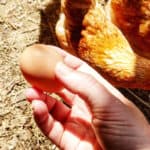This post may contain affiliate links.
What are the differences in keeping guinea fowl and chickens, and can you keep the two types of bird together. You can and we do. Let me tell you a little about each bird.
Guinea Fowl and Chickens
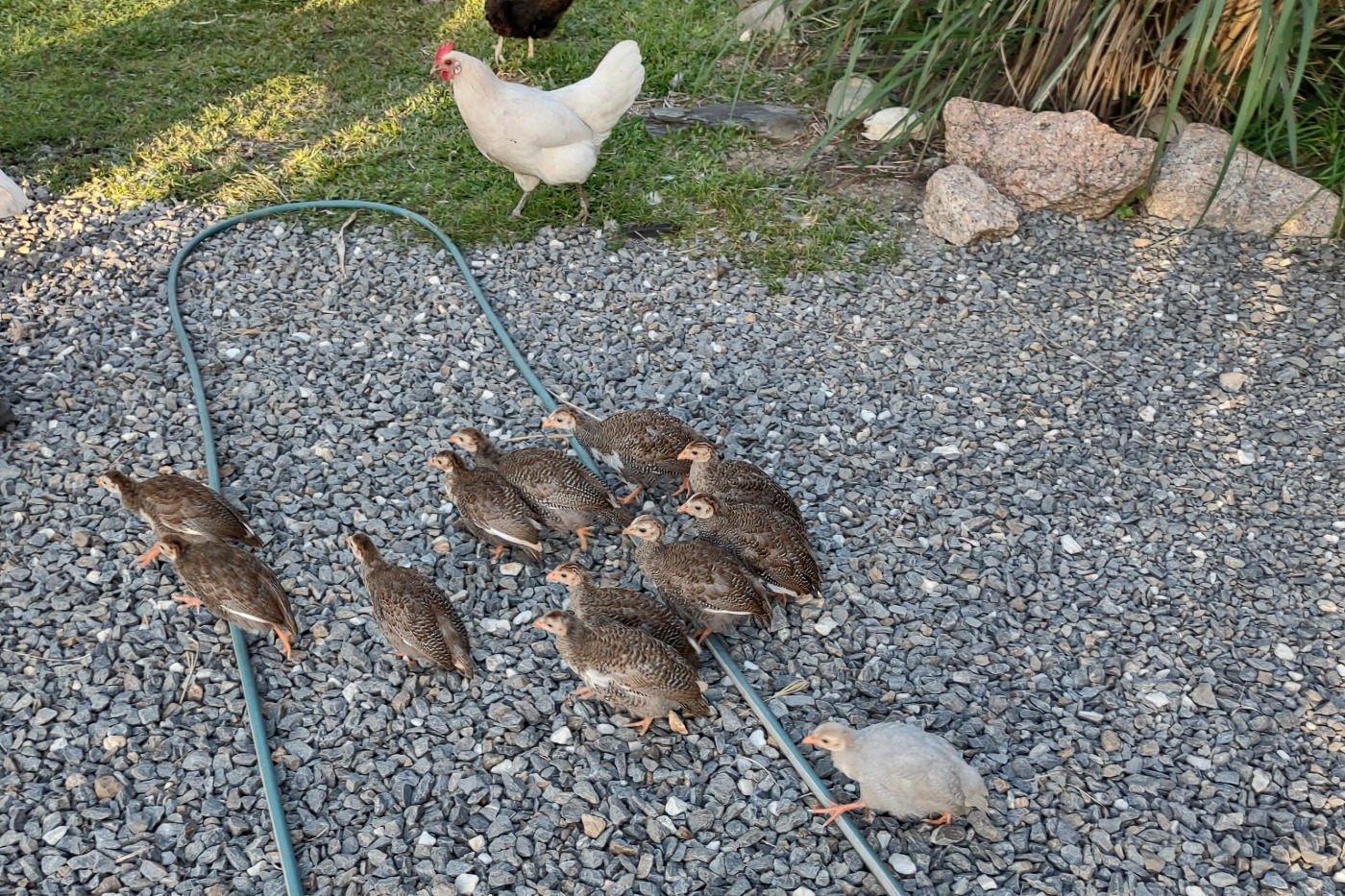
Guinea Fowl vs Chickens Roosting
Chickens will “put themselves to bed” around sundown once they’re familiar with their designated coop. Chickens will roost on whatever perch you give them, in their coop.
Guinea fowl, in contrast, will head for the nearest tree at sundown, and once they’re in the trees, they don’t come down. They’re there for the night.
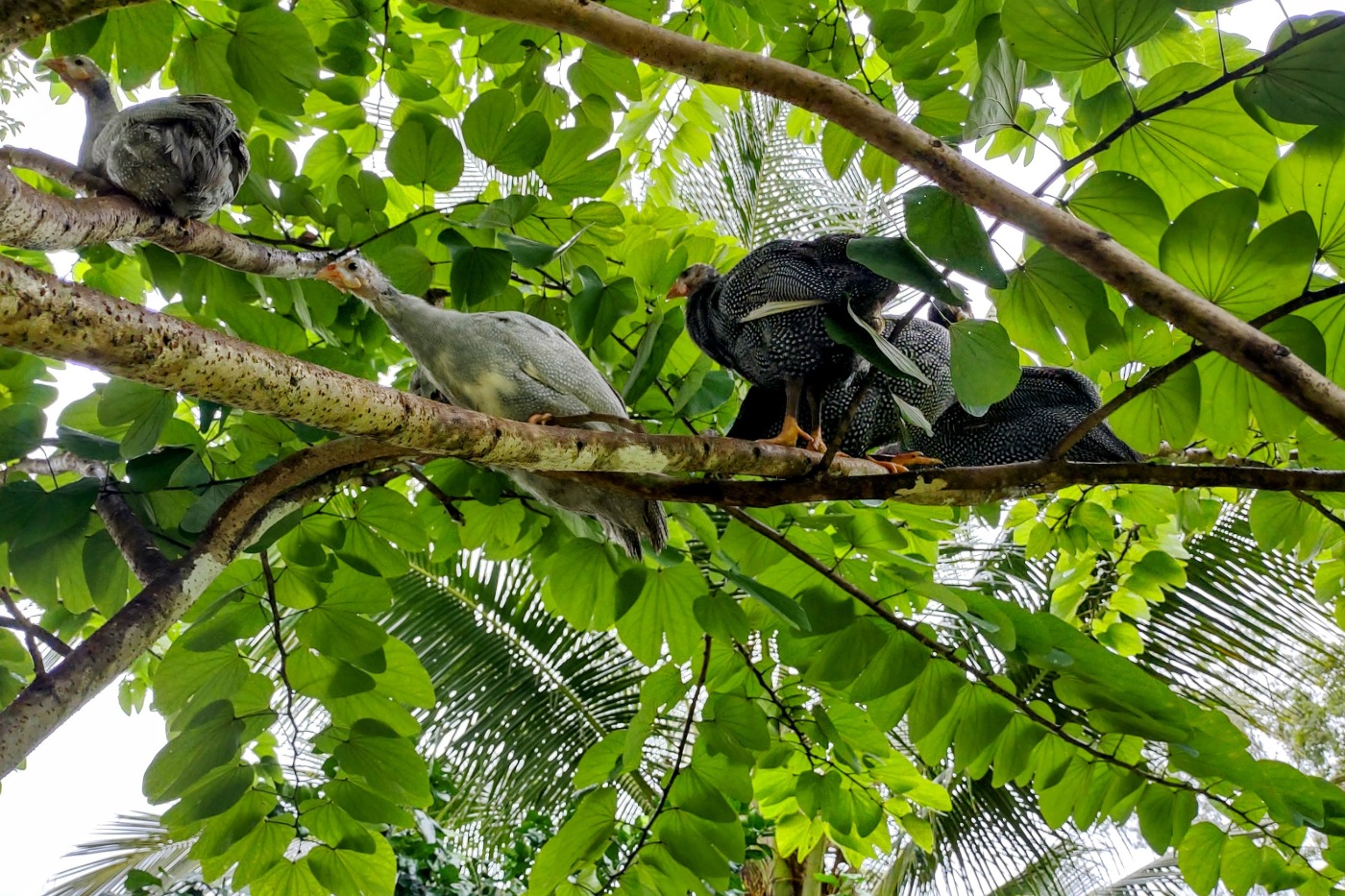
You may think that clipping their wings would stop this. Well, I challenge you to catch them! Flying is their only escape from predators, it’s not advised. We don’t, we don’t clip our chickens’ wings either.
What predators do you have in your area? Our major hazard to guineas and chickens are large snakes, pythons, they can and do eat our birds. If you can convince your guinea fowl to go into a snake-proof coop at night they will be safer.
Your guineas will prefer a high roost.
To get our guinea fowl into the coop late every afternoon, before sundown, we simply feed them in the coop, everyone comes running and we shut the door behind them. Safe for the night.
Our guineas and chickens use the same coop. It’s quite large, with multiple roosts and a run. We use a deep litter system with woodchip and there is rarely any smell. The woodchip has to be on the soil, not on a concrete or wooden floor.
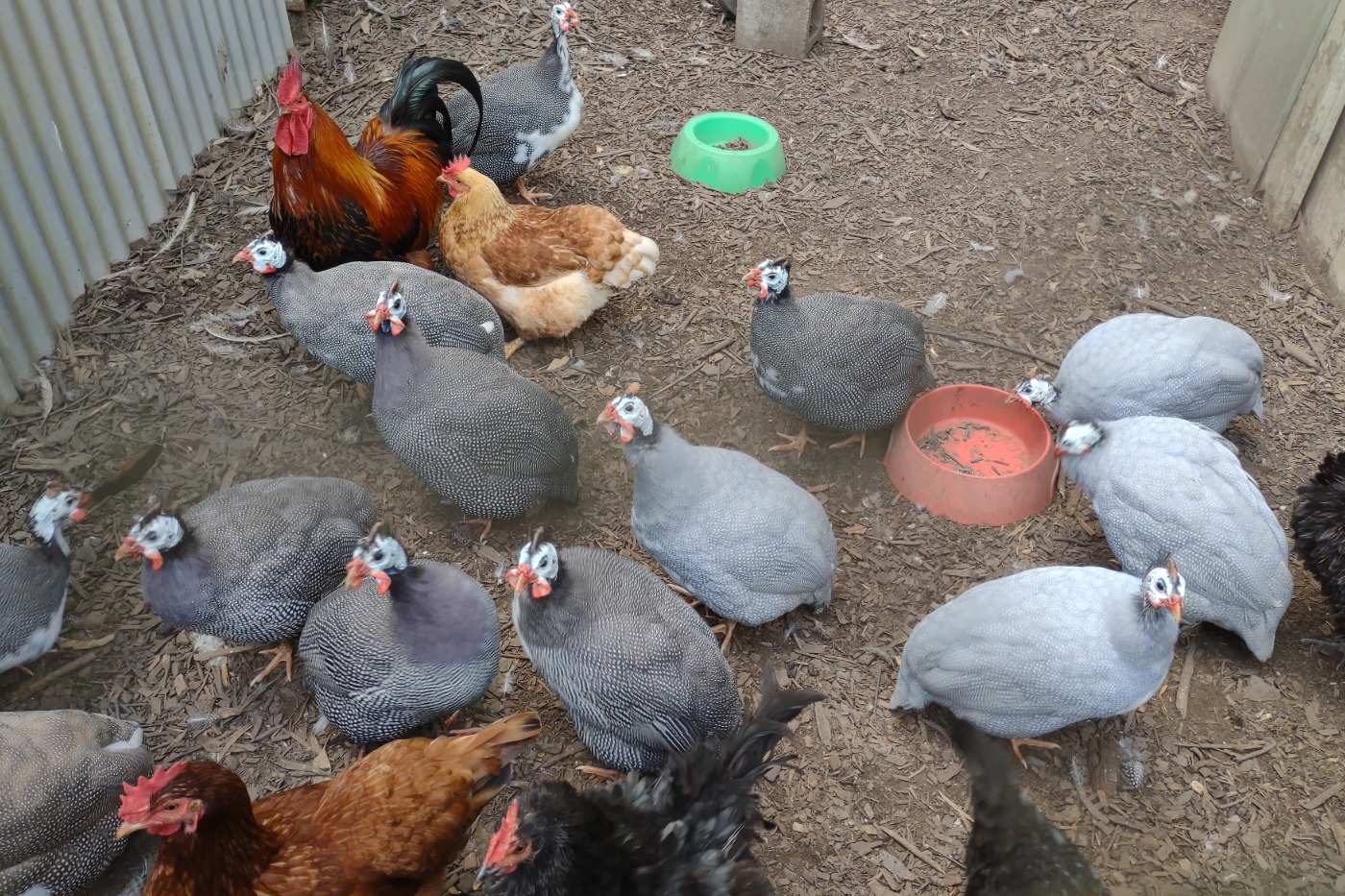
Every now and then we can harvest a batch of compost for the veg garden from under the woodchip.
Housing guinea fowl isn’t really any different to housing chickens, you just need to have a plan for getting them into the coop at night.
Some people successfully keep a flock of guinea fowl “loose” in the trees, and breed more to account for predator losses. Guinea fowl are terrible mothers, you’re better off hatching in an incubator or under a broody hen. Silkies are great for this, they go broody endlessly.
Guineas vs Chickens in the Garden
Both birds will cause some damage to your ornamental and vegetable gardens, but in different ways.
Guinea fowl, in our experience, don’t eat so many of your plants and don’t scratch in your soil. Guineas do like to make large dustbaths and in the drier months they may choose to do this in your lawn. Other than this they’re really not too damaging in a garden. Chickens cause more damage, but neither are as bad as turkeys and geese.
One of the biggest mistakes we made in our farm or homestead was underestimating how much damage poultry would do to any plants. (Likewise kangaroos.)
Guineas vs Chickens for Eggs
Both chickens and guineas lay eggs, both are edible, both taste about the same. Guinea eggs are a bit smaller than most chicken eggs. The big difference between keeping chickens or guineas for eggs lies in seasonality and communal nesting.
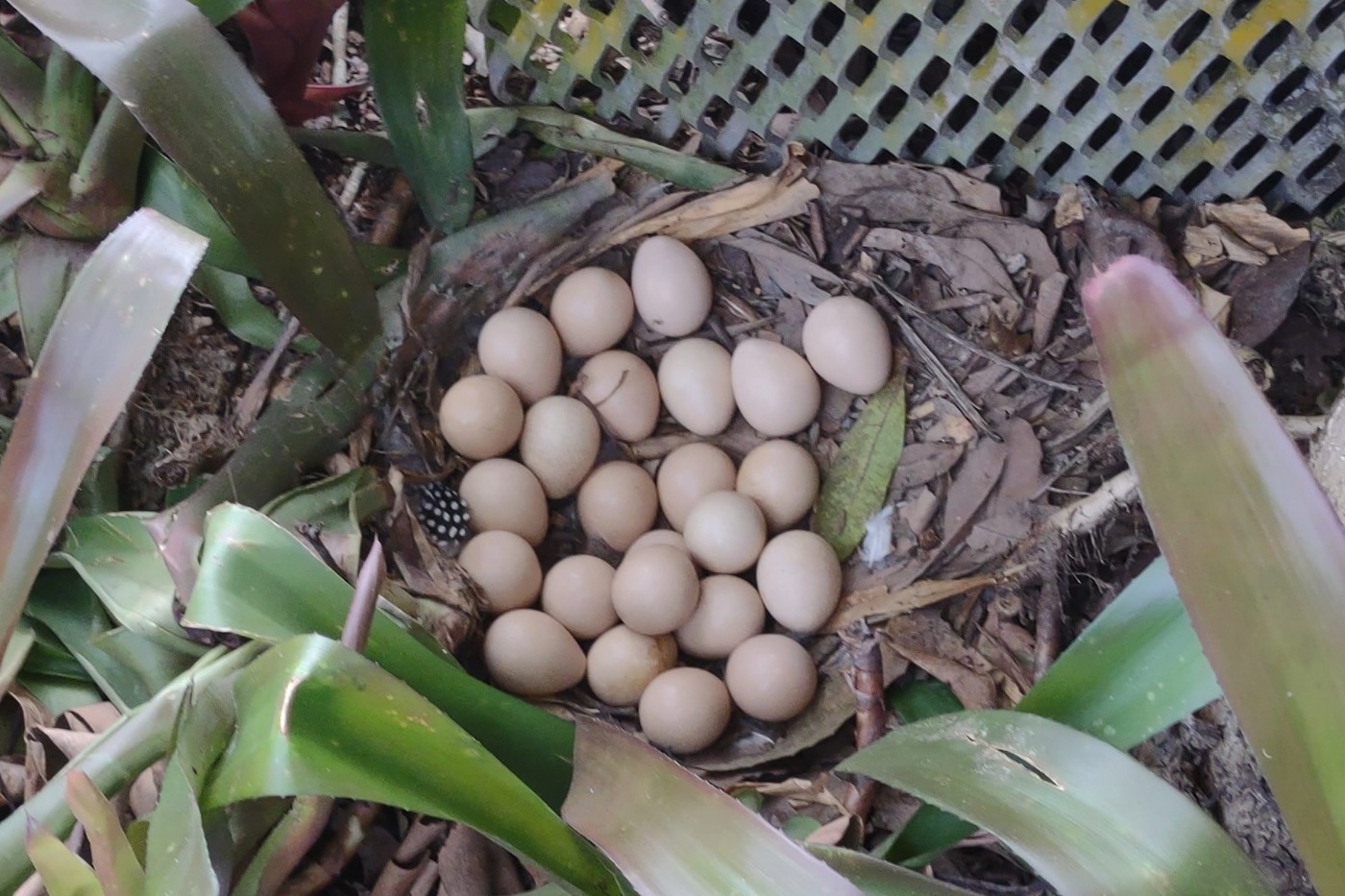
Guineas are seasonal layers. While some (commercial) breeds of chicken will lay through winter, guineas take a break and start laying in spring.
You will find large nests with 20-30 guinea eggs all over your property, often under bushes or in long grass. Sometimes we find guinea fowl nests in the burn pile. You have to keep looking during laying season.
When a communal guinea nest has about 30 eggs, one of the females will start sitting.
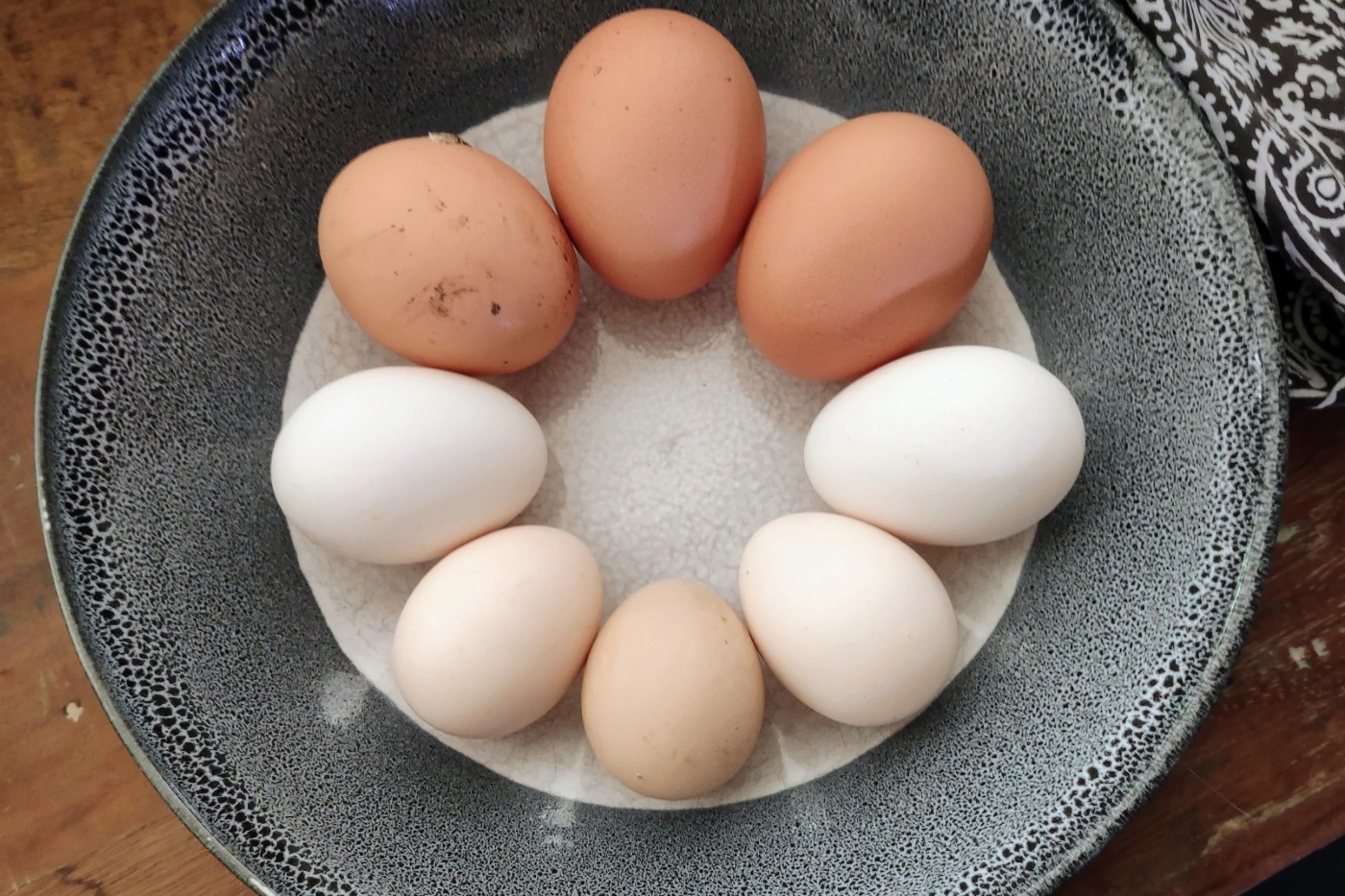
While we have had female guineas successfully hatch eggs, it’s more usual on our farm that they abandon the nest. If this happens throw the eggs into an incubator. Even if they are stone cold they will usually hatch.
If the female hatches keets “in the wild”, it’s usually best to catch them and raise them in a brooder or coop for their own safety. Guineas are not great at keeping keets alive. They don’t realise that the keets can’t follow them through long grass and that they will get cold and wet fast.
Guineas vs Chickens Feed
Our free range guineas eat the same food as the chickens, plus whatever bugs they catch. The keets need a higher protein feed. We use medicated game bird starter or turkey starter.
Both chicks and keets can get splay leg, to prevent thais keep them on a non slip surface.
If symptoms of wry neck (their neck bending around seemingly out of control) there may not be enough B vitamins in the feed. We’ve fixed this with crushed human B vitamin tablets in water.
There are plenty of diseases they can get, but the two problems above are the ones we’ve seen most commonly. Medicated feed prevents coccidosis. We’ve only had problems with this when we’ve not used medicated feed. But what to feed is up to you, some breeders don’t use medicated feed. We do.
Guineas and Chickens as Pets
One of the biggest advantages in keeping guinea fowl is their appetite for ticks. We have never seen a tick on our property. Chickens will also control bugs, spiders, grasshoppers and flies to some extent.
Guineas are said to keep snakes away. We see a lot of snakes. Maybe without the guineas we’d be tripping over snakes daily.
Both guineas and chickens are cute and endearing, but guineas are crazy characters. Guineas can be really noisy, but so can roosters. We don’t think the guineas are nearly as noisy as the geese!
I hope you found this breakdown on the advantages and disadvantages of keeping guinea fowl and chickens useful. We wouldn’t be without either. One word of warning, guinea fowl are African birds and not at all suited to cold climates. They can and do lose toes to frostbite in winter. I would not keep guineas anywhere cold and I believe its cruel to do so. They do great in our tropical backyard. Any questions at all? Put them in the comments. See what else is new on the homestead on our blog page.







